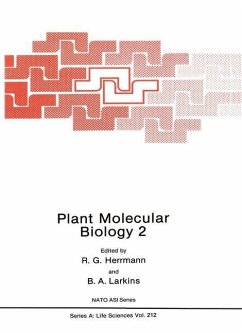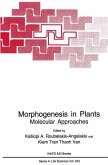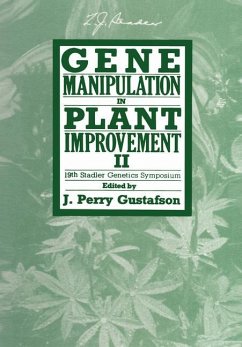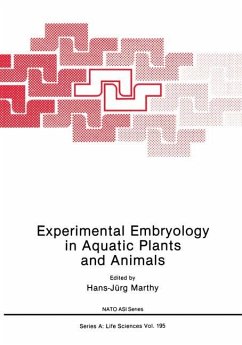Plant Molecular Biology 2
Herausgegeben von Herrmann, R.G.; Larkins, Brian A.
Plant Molecular Biology 2
Herausgegeben von Herrmann, R.G.; Larkins, Brian A.
- Broschiertes Buch
- Merkliste
- Auf die Merkliste
- Bewerten Bewerten
- Teilen
- Produkt teilen
- Produkterinnerung
- Produkterinnerung
The VI NATO Advanced Study Institute on Plant Molecular Biology, held in Elmau, Bavaria, Germany, from 14 to 23 May, 1990, brought together representative scientific leaders from all over the world to review their lastest results. They presented lectures or posters, participated in lively discussions, educated students, and exchanged views and plans for future research in this highly exciting field of science. The experiments, data and questions were naturally varied, but all of them illustrate that the modern techniques of molecular biology, complemented by developments in immunology,…mehr
Andere Kunden interessierten sich auch für
![Morphogenesis in Plants Morphogenesis in Plants]() Morphogenesis in Plants121,99 €
Morphogenesis in Plants121,99 €![Gene Manipulation in Plant Improvement II Gene Manipulation in Plant Improvement II]() Gene Manipulation in Plant Improvement II41,99 €
Gene Manipulation in Plant Improvement II41,99 €![Genetic Engineering Genetic Engineering]() Jane K. SetlowGenetic Engineering41,99 €
Jane K. SetlowGenetic Engineering41,99 €![Genetic Engineering Genetic Engineering]() Jane K. SetlowGenetic Engineering41,99 €
Jane K. SetlowGenetic Engineering41,99 €![Experimental Embryology in Aquatic Plants and Animals Experimental Embryology in Aquatic Plants and Animals]() Experimental Embryology in Aquatic Plants and Animals41,99 €
Experimental Embryology in Aquatic Plants and Animals41,99 €![Plant Cold Hardiness Plant Cold Hardiness]() Plant Cold Hardiness112,99 €
Plant Cold Hardiness112,99 €![The Biology of Acinetobacter The Biology of Acinetobacter]() The Biology of Acinetobacter161,99 €
The Biology of Acinetobacter161,99 €-
-
-
The VI NATO Advanced Study Institute on Plant Molecular Biology, held in Elmau, Bavaria, Germany, from 14 to 23 May, 1990, brought together representative scientific leaders from all over the world to review their lastest results. They presented lectures or posters, participated in lively discussions, educated students, and exchanged views and plans for future research in this highly exciting field of science. The experiments, data and questions were naturally varied, but all of them illustrate that the modern techniques of molecular biology, complemented by developments in immunology, genetics, and ultrastructural research, have pervaded nearly every branch of biology. The presentations show that these approaches have tremendously increased our potential both for fundamental research, our understanding of life, and by analogy to the precedents of physics and chemistry, have led and will continue to lead to "engineering sciences" and implicitly, to new industrial processes. Some of these applications are a matter of debate in the public domain today and many feel that the development of industrial gene technology requires the attention of the whole scientific community. Nevertheless, the implications of this research for the genetic improvement of agricultural plants are profound. Some of the near term technologies being developed provide novel approaches for improving the utility of food crops. They can also result in reduced dependence on the use of pesticides for food production.
Hinweis: Dieser Artikel kann nur an eine deutsche Lieferadresse ausgeliefert werden.
Hinweis: Dieser Artikel kann nur an eine deutsche Lieferadresse ausgeliefert werden.
Produktdetails
- Produktdetails
- Nato Science Series A: 212
- Verlag: Springer / Springer US / Springer, Berlin
- Artikelnr. des Verlages: 978-1-4613-6454-2
- 1991
- Seitenzahl: 784
- Erscheinungstermin: 29. Oktober 2012
- Englisch
- Abmessung: 254mm x 178mm x 42mm
- Gewicht: 1466g
- ISBN-13: 9781461364542
- ISBN-10: 146136454X
- Artikelnr.: 39195495
- Herstellerkennzeichnung Die Herstellerinformationen sind derzeit nicht verfügbar.
- Nato Science Series A: 212
- Verlag: Springer / Springer US / Springer, Berlin
- Artikelnr. des Verlages: 978-1-4613-6454-2
- 1991
- Seitenzahl: 784
- Erscheinungstermin: 29. Oktober 2012
- Englisch
- Abmessung: 254mm x 178mm x 42mm
- Gewicht: 1466g
- ISBN-13: 9781461364542
- ISBN-10: 146136454X
- Artikelnr.: 39195495
- Herstellerkennzeichnung Die Herstellerinformationen sind derzeit nicht verfügbar.
Plant Viruses, Subviral RNAs and Viroids.- Contribution of Plant and Virus Genes to Cauliflower Mosaic Virus Pathogenicity.- Bromovirus RNA Replication and Host Specificity.- Analysis of Tobacco Mosaic Virus-Host Interactions by Directed Genome Modification.- Cell-to-Cell Movement of Plant Viruses.- Tomato Spotted Wilt Virus: A Bunyavirus Invading the Plant Kingdom.- Origin and Evolution of Defective Interfering RNAs of Tomato Bushy Stunt Virus.- Self-Cleavage Activities from Viral Satellite RNAs.- Viroid Structures Involved in Protein Binding and Replication.- Analysis of Viroid Pathogenicity by Genome Modification.- Nitrogen Fixation, Nitrogen Metabolism.- An Extracellular Oligosaccharide Symbiotic Signal Produced by Rhizobium meliloti.- Tissue-Specific Expression of Eariy Nodulin Genes.- Internalization of Rhizobium by Piant Cells: Targeting and Role of Peribacteroid Membrane Nodulins.- Regulation of Nodule Specific Genes.- Regulation of Genes for Enzymes along a Common Nitrogen Metabolic Pathway.- Phytopathology.- Molecular Basis of Plant Defense Responses to Fungal Infections.- Plant Genes Involved in Resistance to Viruses.- Repeated DNA Sequences and the Analysis of Host Specifity in the Rice Blast Fungus.- Molecular Genetics of the Tomato Pathogen Cladosporium fulvum.- Transgenic Potato Cultivars Resistant to Potato Virus X.- Agrobacterium, Transformation.- The Agrobacterium Virulence System.- T-DNA Gene-Functions.- Morphogenetic Genes in the T-DNA of Ri Plasmids.- Transient Expression and Stable Transformation of Maize Using Microprojectiles.- Agroinfection as a Tool for the Investigation of Plant-Pathogen Interactions.- Physical Mapping of the Arabidopsis Genome and its Applications.- Application of Restriction Fragment Length Polymorphism to Maize Breeding.- Soybean Genome Analysis: DNA Polymorphisms are Identified by Oligonucleotide Primers of Arbitrary Sequence.- Genome Analysis in Brassica Using RFLPs.- Physical Mapping of DNA Sequences on Plant Chromosomes by Light Microscopy and High Resolution Scanning Electron Microscopy.- Transposons.- Structure and Function of the Maize Transposable Element Activator (AC).- Expression and Regulation of the Maize Spm Transposable Element.- The En/Spm Transposable Element of Zea mays.- The Mechanism and Control of Tam3 Transposition.- Characterization of Mobile Endogenous Copia-Like Transposable Elements in the Genome of Solanaceae.- Mitochondria, Chloroplasts, Photosynthesis.- Organization and Evolution of the Maize Mitochondrial Genome.- RNA Editing in Wheat Mitochondria: A New Mechanism for the Modulation of Gene Expression.- Topological Orientation of the Membrane Protein URF13.- Cytoplasmic Male Sterility in Petunia.- Nuclear and Chloroplast Genes Involved in the Expression of Specific Chloroplast Genes of Chlamydomonas reinhardtii.- The Thylakoid Membrane of Higher Plants: Genes, their Expression and Interaction.- Greening of Etiolated Monocots - The Impact of Leaf Development on Plastid Gene Expression.- Regulation of Chloroplast Biogenesis in Barley.- Chlorophyll Biosynthesis.- Molecular Approaches to Understand Sink-Source Relations in Higher Plants.- Gene Expression, Photoreceptors.- The Expression of an Ovalbumin and a Seed Protein Gene in the Leaves of Transgenic Plants.- Regulation of Plant Gene Expression by Antisense RNA.- Photocontrol of Gene Expression.- phyA Gene Promoter Analysis.- Approaches to Understanding Phytochrome Regulation of Transcription in Lemna gibba and Arabidopsis thaliana.- Cis-Regulatory Elements for the Circadian Clock Regulated Transcription ofthe Wheat cab-1 Gene.- Plant Development.- Self-Incompatibility as a Model for Cell-Cell Recognition in Flowering Plants.- Floral Homoeotic and Pigment Mutations Produced by Transposon-Mutagenesis in Antirrhinum majus.- Molecular Analysis of the Homeotic Flower Gene deficiens of Antirrhinum majus.- Mutations of Knotted Alter Cell Interactions in the Developing Maize Leaf.- T-DNA Insertion Mutagenesis in Arabidopsis: A Procedure for Unravelling Plant Development.- Protein Transport.- Defining the Vacuolar Targeting Signal of Phytohemagglutinin.- Signals for Protein Import into Organelles.- Protein Translocation Across the Chloroplast Envelope Membrane.- Protein Transport Across the Thylakoid Membrane.- Protein Import into Plant Mitochondria.- Storage Proteins.- Assembly of Maize Storage Proteins into Protein Bodies in Developing Endosperm.- Genetic and Molecular Studies on Endosperm Storage Proteins in Maize.- Assembly Properties of Modified Subunits in the Glycinin Subunit Family.- The Prolamins of the Triticeae (Barley, Wheat and Rye): Structure, Synthesis and Deposition.- Stress Reactions.- Genes Induced by Abscisic Acid and Water Stress in Maize.- Molecular Analysis of Desiccation Tolerance in the Resurrection Plant Craterostigmaplantagineum.- The Anaerobic Responsive Element.- The Induction of the Heat Shock Response: Activation and Expression of Chimaeric Heat Shock Genes in Transgenic Plants.- Oxidative Stress in Plants.- Interesting Pathways.- Elucidating Lipid Metabolism Using Mutants of Arabidopsis.- Alkaloids: A New Target for Molecular Biology.- The Shikimate Pathway's First Enzyme.- ACC Synthase Genes in Zucchini and Tomato.- Molecular Analysis of Anthocyanin Genes of Zea mays.- Author Index.
Plant Viruses, Subviral RNAs and Viroids.- Contribution of Plant and Virus Genes to Cauliflower Mosaic Virus Pathogenicity.- Bromovirus RNA Replication and Host Specificity.- Analysis of Tobacco Mosaic Virus-Host Interactions by Directed Genome Modification.- Cell-to-Cell Movement of Plant Viruses.- Tomato Spotted Wilt Virus: A Bunyavirus Invading the Plant Kingdom.- Origin and Evolution of Defective Interfering RNAs of Tomato Bushy Stunt Virus.- Self-Cleavage Activities from Viral Satellite RNAs.- Viroid Structures Involved in Protein Binding and Replication.- Analysis of Viroid Pathogenicity by Genome Modification.- Nitrogen Fixation, Nitrogen Metabolism.- An Extracellular Oligosaccharide Symbiotic Signal Produced by Rhizobium meliloti.- Tissue-Specific Expression of Eariy Nodulin Genes.- Internalization of Rhizobium by Piant Cells: Targeting and Role of Peribacteroid Membrane Nodulins.- Regulation of Nodule Specific Genes.- Regulation of Genes for Enzymes along a Common Nitrogen Metabolic Pathway.- Phytopathology.- Molecular Basis of Plant Defense Responses to Fungal Infections.- Plant Genes Involved in Resistance to Viruses.- Repeated DNA Sequences and the Analysis of Host Specifity in the Rice Blast Fungus.- Molecular Genetics of the Tomato Pathogen Cladosporium fulvum.- Transgenic Potato Cultivars Resistant to Potato Virus X.- Agrobacterium, Transformation.- The Agrobacterium Virulence System.- T-DNA Gene-Functions.- Morphogenetic Genes in the T-DNA of Ri Plasmids.- Transient Expression and Stable Transformation of Maize Using Microprojectiles.- Agroinfection as a Tool for the Investigation of Plant-Pathogen Interactions.- Physical Mapping of the Arabidopsis Genome and its Applications.- Application of Restriction Fragment Length Polymorphism to Maize Breeding.- Soybean Genome Analysis: DNA Polymorphisms are Identified by Oligonucleotide Primers of Arbitrary Sequence.- Genome Analysis in Brassica Using RFLPs.- Physical Mapping of DNA Sequences on Plant Chromosomes by Light Microscopy and High Resolution Scanning Electron Microscopy.- Transposons.- Structure and Function of the Maize Transposable Element Activator (AC).- Expression and Regulation of the Maize Spm Transposable Element.- The En/Spm Transposable Element of Zea mays.- The Mechanism and Control of Tam3 Transposition.- Characterization of Mobile Endogenous Copia-Like Transposable Elements in the Genome of Solanaceae.- Mitochondria, Chloroplasts, Photosynthesis.- Organization and Evolution of the Maize Mitochondrial Genome.- RNA Editing in Wheat Mitochondria: A New Mechanism for the Modulation of Gene Expression.- Topological Orientation of the Membrane Protein URF13.- Cytoplasmic Male Sterility in Petunia.- Nuclear and Chloroplast Genes Involved in the Expression of Specific Chloroplast Genes of Chlamydomonas reinhardtii.- The Thylakoid Membrane of Higher Plants: Genes, their Expression and Interaction.- Greening of Etiolated Monocots - The Impact of Leaf Development on Plastid Gene Expression.- Regulation of Chloroplast Biogenesis in Barley.- Chlorophyll Biosynthesis.- Molecular Approaches to Understand Sink-Source Relations in Higher Plants.- Gene Expression, Photoreceptors.- The Expression of an Ovalbumin and a Seed Protein Gene in the Leaves of Transgenic Plants.- Regulation of Plant Gene Expression by Antisense RNA.- Photocontrol of Gene Expression.- phyA Gene Promoter Analysis.- Approaches to Understanding Phytochrome Regulation of Transcription in Lemna gibba and Arabidopsis thaliana.- Cis-Regulatory Elements for the Circadian Clock Regulated Transcription ofthe Wheat cab-1 Gene.- Plant Development.- Self-Incompatibility as a Model for Cell-Cell Recognition in Flowering Plants.- Floral Homoeotic and Pigment Mutations Produced by Transposon-Mutagenesis in Antirrhinum majus.- Molecular Analysis of the Homeotic Flower Gene deficiens of Antirrhinum majus.- Mutations of Knotted Alter Cell Interactions in the Developing Maize Leaf.- T-DNA Insertion Mutagenesis in Arabidopsis: A Procedure for Unravelling Plant Development.- Protein Transport.- Defining the Vacuolar Targeting Signal of Phytohemagglutinin.- Signals for Protein Import into Organelles.- Protein Translocation Across the Chloroplast Envelope Membrane.- Protein Transport Across the Thylakoid Membrane.- Protein Import into Plant Mitochondria.- Storage Proteins.- Assembly of Maize Storage Proteins into Protein Bodies in Developing Endosperm.- Genetic and Molecular Studies on Endosperm Storage Proteins in Maize.- Assembly Properties of Modified Subunits in the Glycinin Subunit Family.- The Prolamins of the Triticeae (Barley, Wheat and Rye): Structure, Synthesis and Deposition.- Stress Reactions.- Genes Induced by Abscisic Acid and Water Stress in Maize.- Molecular Analysis of Desiccation Tolerance in the Resurrection Plant Craterostigmaplantagineum.- The Anaerobic Responsive Element.- The Induction of the Heat Shock Response: Activation and Expression of Chimaeric Heat Shock Genes in Transgenic Plants.- Oxidative Stress in Plants.- Interesting Pathways.- Elucidating Lipid Metabolism Using Mutants of Arabidopsis.- Alkaloids: A New Target for Molecular Biology.- The Shikimate Pathway's First Enzyme.- ACC Synthase Genes in Zucchini and Tomato.- Molecular Analysis of Anthocyanin Genes of Zea mays.- Author Index.








